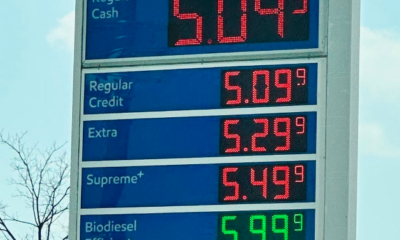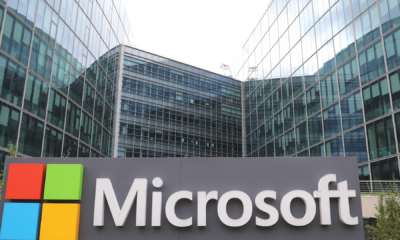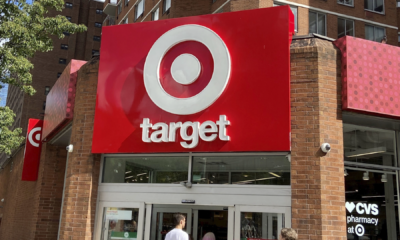ECONOMY
Visa, Mastercard Share Prices Jump On Report Of Upcoming Merchant Fee Hikes
Published
9 months agoon

Courtesy of visa_us/mastercard/Instagram
Visa and Mastercard share prices shot up late Wednesday after The Wall Street Journal reported the companies are set to raise credit card merchant fees.
The merchant fees, which retailers pay to accept a customer’s credit card, are a major source of revenue for the companies, amounting to tens of billions of dollars in the U.S. alone. Mastercard’s share price reached an all-time high on the news.
The companies collect both interchange fees, which are charged for every swiped transaction, and assessment fees, which are paid based on monthly sales. Business owners often pay additional fees to separate payment processors to facilitate those transactions.
According to the Journal, Visa intends to hike its fees in October, with Mastercard following in April. Consulting firm CMSPI told the paper it estimated the increased fees would cost merchants an extra $502 million per year.
While swipe fees are a source of aggravation for many small businesses, particularly amid high inflation, it’s the big businesses that pay the most, and can afford to fight for caps.
“Consumers have been put in the middle of a tug-of-war between two powerful lobbying groups: big retailers and banks. While giant retailers like Walmart and Amazon have made their case in favor of fee caps, Visa and Mastercard clearly weren’t convinced,” said Richard Barrington, financial analyst for Credit Sesame.
The companies are seeking more revenue at the same time that the Consumer Financial Protection Bureau is poised to order a cap on the late fees credit card customers pay.
“Late fees currently average $26 for a first-time missed payment, and $35 for repeated missed payments. The Consumer Financial Protection Bureau (CFPB) wants to cap these fees at $8,” Barrington said.
The proposed rule would cap automatic fees at $8, but card issuers could charge higher fees — amounting to no more than 25% of the user’s minimum payment — if their costs related to the late payment exceed $8.
The CFPB estimates the caps could save consumers up to $9 billion of the $12 billion worth of late fees it says card issuers collected in 2020.
The CFPB says card issuers collected $12 billion in late fees in 2020, and the agency estimates the proposed caps could have saved consumers up to $9 billion of that.
TMX contributed to this article.
Related Topics:

More Money + Investing
-


Student Loan Interest Resumes Sept. 1, With Payments Due in…
-


Consumer Confidence Drops As Gas And Grocery Prices Remain Stubbornly…
-


Walmart to cut hundreds of corporate positions
-


According to reports, Elon Musk informed investors that he intended…
-


Meta Layoffs Looming, Per Reports
-


Microsoft Earnings Slowdown Softened By Cloud Growth
-


Oil drops below $90 as concerns about a recession grow
-


Shareholders of Twitter overwhelmingly approve Elon Musk’s $44 billion acquisition…
-


Federal Reserve Holds Interest Rates Steady For The Second Time…
-


Risk of a substantial reversal in gold prices as inflation…
-


Signify Health shares increase following news of a potential CVS…
-


Target issues a holiday sales warning due to declining profits